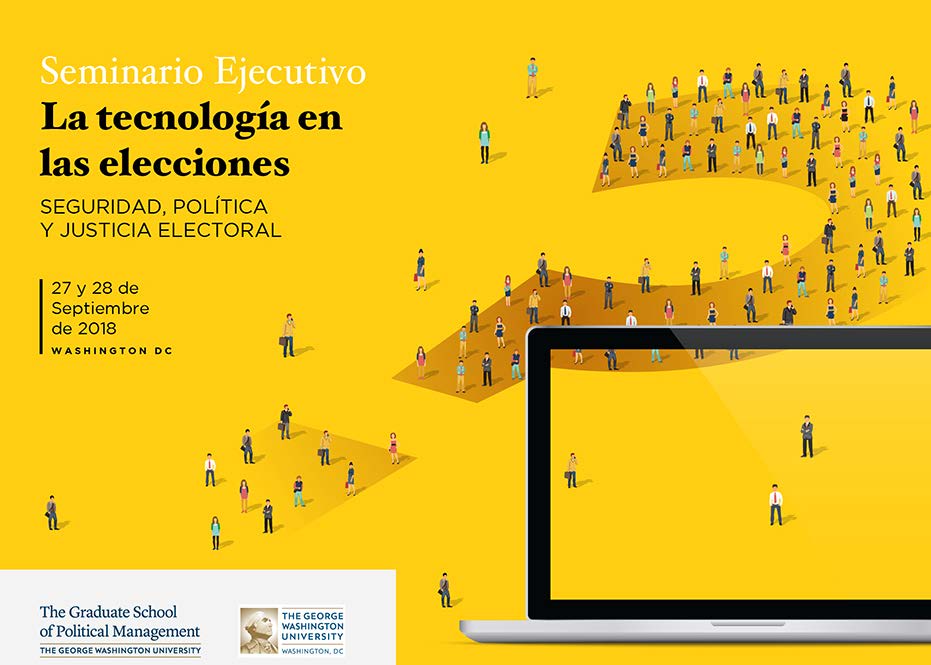The Graduate School of Political Management (GSPM)’s Executive Seminar on Technology in Elections explored the significant impact the use of technology is having on electoral environments. As new IT techniques are increasingly being used to interfere in elections, the topics of security, politics and electoral justice came center stage in the discussion.
GSPM brought together ten highly-qualified speakers at the Sept. 27-28, 2018 seminar, who were able to share their points of view on the topic from different areas of expertise and geographical backgrounds, as well as anticipate what may come in future election cycles.
The speakers, presenting to politicians, electoral court judges and students from Latin America, recognized that interference of technologies in the electoral world has spread like wildfire. Cases such as the Brexit, the USA-Russia affair, the referendum of Catalonia and the elections in France, have commanded international attention.
Electoral campaign managers now have an arsenal of new terminologies in the electoral environment, which can help them sway voter opinion, such as Big Data, data-mining, micro-segmentation, and robot programs with increasingly intelligent algorithms. They are also contending with Hackers, Trolls and Fakes who attack with unconventional weapons looking to influence the voter through questionable ethical and legal frameworks.
Participants were urged to have a forward-looking vision and try to anticipate the new realities of elections, both today and in the future. Those who have responsibilities in any of the areas of political-electoral world, such as judicial magistrates, administrators of electoral processes, supporters, campaign consultants, politicians, legislators, or others, need to be up-to-date on technology trends and consider their impacts on elections around the world. Each new election is like a laboratory experiment with the methods and results still unknown.
Seminar Presenters Included:
Ann M. Ravel: Former president and vice president of the Federal Electoral Commission (FEC) of the United States, an independent regulatory agency created by Congress to administer and enforce campaign financing law. She is currently a professor at the Faculty of Law at the University of California at Berkeley.
Connie Peterson Uthoff: She is the associate program director of the Cybersecurity Strategy & Information Management at The George Washington University. Se has written and extensively trained in areas of national security, international cyber threats and strategies, introduction to cyber warfare and operational design to the Department of Defense of the United States and the new Cybernetic Command in Spain. Bio on GW/CPS website
Michael Cornfield: Research Director of the Global Center for Political Participation in The Graduate School of Political Management, GSPM, GW. He has been a political advisor in the United States Congress, specialist in online electoral campaigns, has developed innovative qualitative and quantitative methods to extract political intelligence from keywords and publications in social networks
Elaine Lammert: She is the program director for GW’s Homeland Security Program and Cybersecurity Strategy and Information Management Program. Elaine came to GW after 28 years of service as a special agent of the FBI. She retired as deputy general director in the office of the FBI's general counsel. She worked on investigations for organized crime, drugs and terrorism. Bio on GW/CPS website
Belisario Contreras: He directs the Cybersecurity Program in the Organization of American States (OAS). In recent years, he has been involved in the development of National Cybersecurity Policies and Strategies for countries such as Chile, Colombia, Costa Rica, Guatemala, Mexico, Panama, Paraguay and others. In addition, it has contributed to the establishment of 21 cybernetic emergency response teams (CERT) in Latin America.
Maria Velez de Berliner: Berliner tests the assumptions behind security policies and projects the results for the Department of Defense and National Security of the United States, the United States Army and the Defense Advanced Research Projects Agency (DARPA). She is a professor of Intelligence and Strategic Analysis, Political Violence and Terrorism, and International Cooperation in the GW. She is the general director, "RTC-Red Team Group Inc,” a company specialized in solving large cybersecurity problems.
Julio Cesar Castanos: Magistrate Castaños is president of the Central Electoral Board (JCE), a position for which he has been appointed for two terms 2016-2020, 2006-2010 by the Honorable Senate of the Dominican Republic. In addition, he was First Substitute of the President of the Supreme Court of Justice, President of the Civil and Commercial Chamber in 2011 until 2016, Prosecutor of the National District and Secretary of State.
Paula Berman: She is a researcher on the impacts of new technologies such as internet, social networks and blockchain in electoral processes and in the development of democracy. Co-author of the article "The Intelligent Social Contract" published in September 2017 on the open-source platform Github,and translated into more than eight languages since then. She heads the Ambassador Program for the Democracy Earth Foundation (DEFT).
Guillermo Riera: He was in charge of digital communication in the mid-term election campaign, which resulted in a new triumph for President Macri's team. In 2015 he led the digital team that led to the triumph of Cambiemos in the presidential elections. He was undersecretary of the Vínculo Ciudadano de la Nación, from where he was responsible for the online communication of the Argentine state. He is a consultant in digital political communication. He has a long career in the corporate world of communication through the Internet: he was an e-business manager of the HSBC group and was in charge of the digital media of La Nación newspaper in Argentina.
Pedro Hernandez: He was the leading expert in digital analytics and social networks for all the World Bank websites in Washington DC, in the last 10 years. Specialist in digital communication, campaigns and digital media. He worked as head of the Internet Channel of AFP Hábitat Chile, the second most important pension administrator in Chile and as head of Web Quality in the social media to predict the results of elections.
Related Resources


